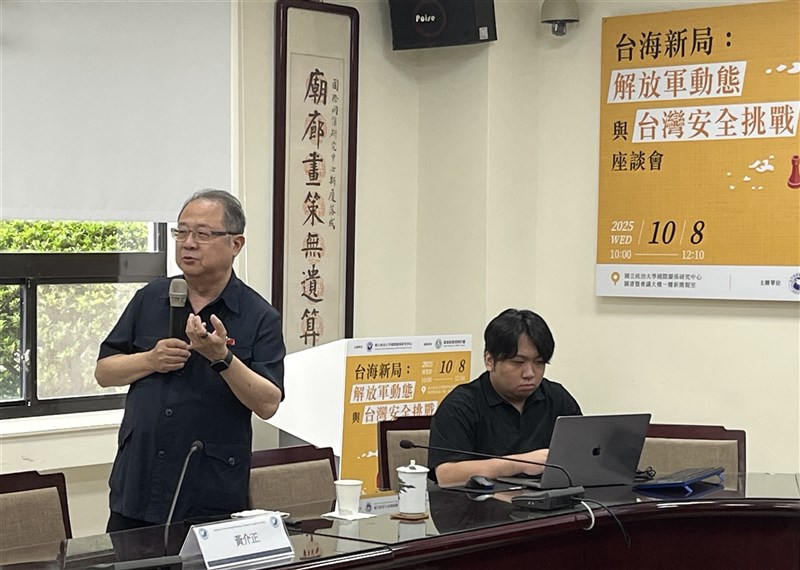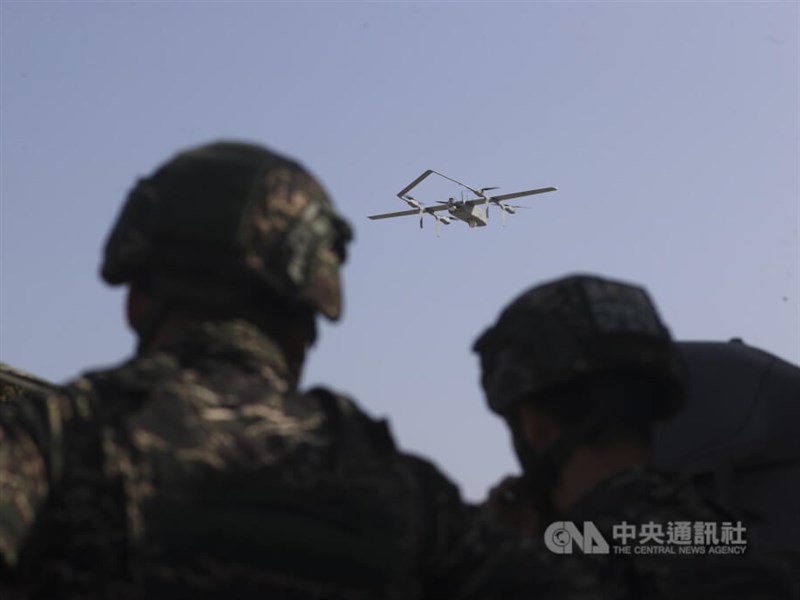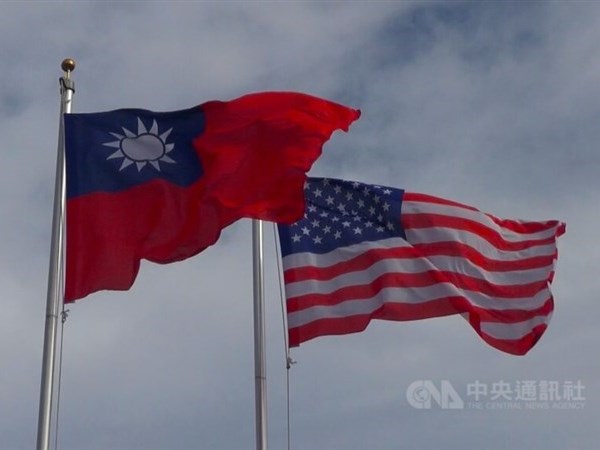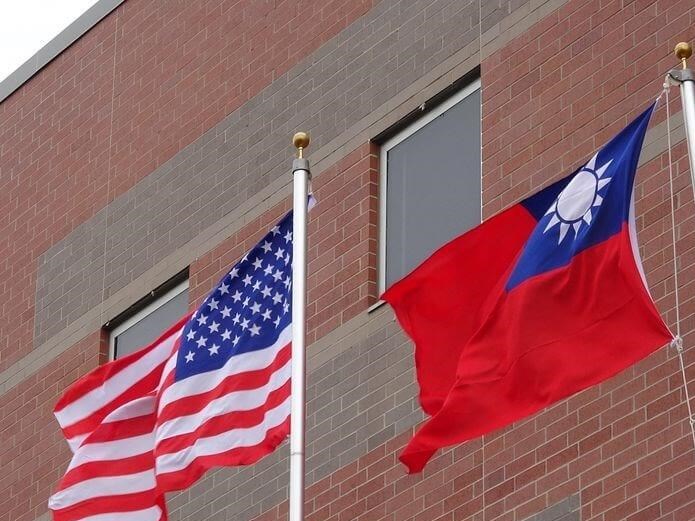DEFENSE / Military expert rebuts claim 4-5 Chinese subs could blockade Taiwan

Taipei, Oct. 9 (CNA) A Taiwanese military expert on Wednesday rejected a China studies scholar's claim that Beijing could impose a naval blockade on Taiwan by sending a few submarines into waters around the island country, questioning how long such a blockade could be sustained.
Based on impressions from two visits to Taiwan over the past three months, China studies scholar Willy Lam (林和立) said at an Oct. 1 symposium in Washington, D.C., that "all the Chinese need to do is send four or five submarines to impose a naval blockade of the island."
Lam, a senior fellow at The Jamestown Foundation, speculated that if Chinese President Xi Jinping (習近平) orders "a big move on Taiwan," the People's Liberation Army (PLA) would impose an effective naval blockade "which they could do quite easily."
Speaking at a Taipei seminar held Wednesday by National Chengchi University's Institute of International Relations, Alexander Huang (黃介正) of Tamkang University said that strictly from a military perspective, the central question is how long a submarine blockade could be sustained if attempted.
"A nuclear-powered submarine might be able to stay in position for a long time, but crews still need to eat and sleep, so it can't remain there indefinitely," said Huang, an associate professor at the university's Graduate Institute of International Affairs and Strategic Studies.
"With any blockade, the key question is how long you can sustain it, because it can't last forever," he said, in response to a question from CNA.
Another factor to consider is "whether those submarines can make it back," Huang said, noting that other countries' submarines might block their way to home ports in China.
If it comes to combat, those submarines may not make it back, Huang said, noting that Taiwan "is not without the means to hit back."
A wargaming expert, Huang said that while Taiwan would be under great pressure in such a scenario, the longer a blockade lasts, the stronger the likelihood of international intervention becomes.
"If the United States were to blockade the Strait of Malacca and bar Chinese ships from passing, Yangshan Port could also be struck," he said, referring to the deep-water port off Shanghai that is an important hub for China's import and export trade.
Lam's remarks also drew reactions from Taiwanese officials at home and abroad.
After Lam delivered his remarks at the symposium, he was immediately countered by Taiwan's representative to the U.S., Alexander Yui (俞大㵢), who also attended the event hosted by the Global Taiwan Institute.
Disagreeing with Lam's claim that a handful of submarines could blockade Taiwan, Yui said at the time the determination of the Taiwanese people to defend themselves is "pretty strong," citing the tens of thousands who voluntarily went to Hualien County to assist with cleanup and recovery in areas hit by recent flooding.
Liang Wen-chieh (梁文傑), deputy head and spokesperson of Taiwan's Mainland Affairs Council, also refuted Lam's claim at a regular news briefing in Taipei.
"If it were that easy, all our years of force building and readiness would have been for nothing," Liang said at the Thursday briefing.
"I therefore strongly disagree with his claim," he added.
-
![U.S. think tank calls for 'hellscape' drone strategy for Taiwan]() U.S. think tank calls for 'hellscape' drone strategy for TaiwanA U.S. think tank has urged Taiwan to adopt a "hellscape" strategy that would flood the Taiwan Strait with drones and other uncrewed systems to deter a potential invasion by China.02/27/2026 12:00 PM
U.S. think tank calls for 'hellscape' drone strategy for TaiwanA U.S. think tank has urged Taiwan to adopt a "hellscape" strategy that would flood the Taiwan Strait with drones and other uncrewed systems to deter a potential invasion by China.02/27/2026 12:00 PM -
![New U.S. arms sales strategy favors Taiwan, but ambiguity remains: Experts]() New U.S. arms sales strategy favors Taiwan, but ambiguity remains: ExpertsThe United States' new "America First Arms Transfer Strategy" could benefit Taiwan, though much will depend on how it is implemented and whether Taipei approves sufficient funding, U.S. defense experts said Wednesday.02/12/2026 12:31 PM
New U.S. arms sales strategy favors Taiwan, but ambiguity remains: ExpertsThe United States' new "America First Arms Transfer Strategy" could benefit Taiwan, though much will depend on how it is implemented and whether Taipei approves sufficient funding, U.S. defense experts said Wednesday.02/12/2026 12:31 PM -
![Washington's new arms sales strategy good for Taiwan: U.S. expert]() Washington's new arms sales strategy good for Taiwan: U.S. expertA U.S. defense expert has said that Washington's "America First Arms Transfer Strategy" is good for Taiwan but warned that continued delays in passing defense budgets could put Taiwan's status as a priority partner at risk.02/08/2026 04:09 PM
Washington's new arms sales strategy good for Taiwan: U.S. expertA U.S. defense expert has said that Washington's "America First Arms Transfer Strategy" is good for Taiwan but warned that continued delays in passing defense budgets could put Taiwan's status as a priority partner at risk.02/08/2026 04:09 PM
-
Politics
Taiwan-U.S. trade deal still in limbo: Premier
03/03/2026 01:06 PM -
Business
Taiwan's consumer confidence weakens slightly in February
03/03/2026 11:07 AM -
Business
U.S. dollar higher in Taipei trading
03/03/2026 10:42 AM -
Culture
Mandopop singer Sun Yanzi to perform at Taipei Dome in May
03/03/2026 10:22 AM -
Society
Heavy rain advisory in effect for Nantou County
03/03/2026 10:16 AM


